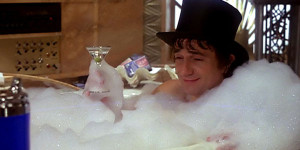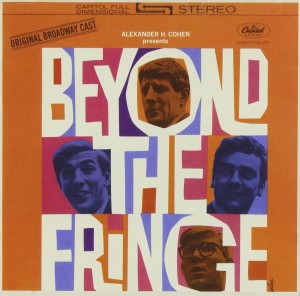
Yet he was jealous, though he did not show it,
For jealousy dislikes the world to know it.
Lord Byron, Don Juan
Terry Teachout on the arts in New York City
I found this questionnaire in my e-mailbox earlier today and thought it might be fun to answer it in public:
• What time did you get up this morning? Eight a.m.
• Diamonds or pearls? No preference.
• What was the last film you saw at the cinema? Believe it or not, Capote.
• What is your favorite TV show? I really don’t have one, though I’ve been enjoying the reruns of The Equalizer currently playing on Sleuth TV.
• What did you have for breakfast? Grape-Nuts and skim milk, with a few raisins thrown in.
• What is your middle name? Alan.
• What is your favorite cuisine?, Er, yikes, that’s a tough one! Maybe sushi?
• What food do you dislike? Blue cheese.
• What is your favorite potato chip? Salt and vinegar, mmmmm.
• What is your favorite CD at the moment? Rosanne Cash’s Black Cadillac….
Read the whole thing here.
 “The more one suffers, the more, I believe, has one a sense for the comic. It is only by the deepest suffering that one acquires true authority in the use of the comic, an authority which by one word transforms as by magic the reasonable creature one calls man into a caricature.”
“The more one suffers, the more, I believe, has one a sense for the comic. It is only by the deepest suffering that one acquires true authority in the use of the comic, an authority which by one word transforms as by magic the reasonable creature one calls man into a caricature.”
Søren Kierkegaard, Stages on Life’s Way
 I first became aware of Dudley Moore when I saw 10 and Arthur, two hugely successful films of my youth that are no longer well remembered (though Arthur is still funny, albeit politically incorrect in the extreme—it seems we are no longer allowed to laugh at drunks). I had no idea at the time that he was already famous in England and among American Anglophiles for appearing in Beyond the Fringe, a 1960 stage revue of which I then knew nothing. To me he was an amusing film actor whose career petered out with appalling rapidity not long after the release of Arthur, and that, for the moment, was that.
I first became aware of Dudley Moore when I saw 10 and Arthur, two hugely successful films of my youth that are no longer well remembered (though Arthur is still funny, albeit politically incorrect in the extreme—it seems we are no longer allowed to laugh at drunks). I had no idea at the time that he was already famous in England and among American Anglophiles for appearing in Beyond the Fringe, a 1960 stage revue of which I then knew nothing. To me he was an amusing film actor whose career petered out with appalling rapidity not long after the release of Arthur, and that, for the moment, was that.
I did, however, know from 10 that Moore was a very fine mainstream jazz pianist, and when I finally caught up with Beyond the Fringe long after the fact, I discovered that he was also a classical-music parodist of something not unlike genius. Fortunately for posterity, Beyond the Fringe was filmed for TV and has since been carved up and posted on YouTube, and so it is now possible both to see and hear some of Moore’s stupendously ingenious musical mimicry.
I wrote in this space about “Little Miss Britten,” Moore’s parody of Benjamin Britten and Peter Pears, when it first surfaced on the web six years ago:
I sent it to an opera coach who plays a lot of Britten, and she promptly wrote back, “This is the funniest thing I’ve ever, ever seen.” I might add that she loves Britten’s music. So do I—and so did Moore, who claimed that he wrote “Little Miss Britten” “out of absolute love and admiration for Britten and with no malice aforethought at all.” Alas, it won’t make any sense unless you know the original, but if you do, you’ll laugh so hard as to run the risk of self-injury.
(Would that Britten had found it funny, too, but he had no sense of humor whatsoever when it came to himself, and is said to have been deeply offended.)
 What I find especially interesting in retrospect is that Beyond the Fringe was successful in England and America, where it ran for 667 performances on Broadway and made semi-stars out of Moore, Alan Bennett, Peter Cook, and Jonathan Miller, who in due course became sufficiently well-known to the public at large to be invited to appear as the mystery guests on a 1962 episode of What’s My Line? Arlene Francis identified them after just six questions, an accurate index of their notoriety.
What I find especially interesting in retrospect is that Beyond the Fringe was successful in England and America, where it ran for 667 performances on Broadway and made semi-stars out of Moore, Alan Bennett, Peter Cook, and Jonathan Miller, who in due course became sufficiently well-known to the public at large to be invited to appear as the mystery guests on a 1962 episode of What’s My Line? Arlene Francis identified them after just six questions, an accurate index of their notoriety.
It flabbergasts me to think me that so unabashedly eggheady a show as Beyond the Fringe became a Broadway hit, much less that a man capable of spoofing Britten and Pears with such wickedly knowing precision could ever have become a movie star, however briefly. I’ve had a lot to say over the years about middlebrow culture, but I doubt there’s a more powerful demonstration of what it once meant than the career of Dudley Moore, who died in 2002, gravely ill (he had a degenerative disorder of the brain) and largely forgotten. He deserved better, and still does.
* * *
Dudley Moore performs “Little Miss Britten” and “The Ballad of Gangster Joe,” from Beyond the Fringe:
Dudley Moore performs “Colonel Bogey” in the style of a Beethoven piano sonata, from Beyond the Fringe:
The Dudley Moore Trio plays “Just in Time” on British TV circa 1965. Pete McGurk is the bassist, Chris Karan the drummer:
| M | T | W | T | F | S | S |
|---|---|---|---|---|---|---|
| 1 | 2 | |||||
| 3 | 4 | 5 | 6 | 7 | 8 | 9 |
| 10 | 11 | 12 | 13 | 14 | 15 | 16 |
| 17 | 18 | 19 | 20 | 21 | 22 | 23 |
| 24 | 25 | 26 | 27 | 28 | 29 | 30 |
| 31 | ||||||
An ArtsJournal Blog